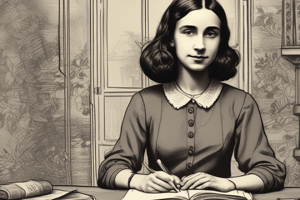Podcast
Questions and Answers
What do Elie Wiesel and other survivors believe is their duty regarding the Holocaust?
What do Elie Wiesel and other survivors believe is their duty regarding the Holocaust?
To share their stories so the world will remember the Holocaust.
Have human rights violations occurred in recent history? Where?
Have human rights violations occurred in recent history? Where?
Yes, in much of the Islamic world where women lack equality, religious dissenters are persecuted, and political freedoms are curtailed.
Is Elie's father a help or a burden?
Is Elie's father a help or a burden?
Both; his father's presence helps Elie survive, though he is also a burden.
Does learning about history help to ensure that tragedies are not repeated? Why or why not?
Does learning about history help to ensure that tragedies are not repeated? Why or why not?
How should world leaders respond to human rights violations?
How should world leaders respond to human rights violations?
Why did the Nazis implement restrictions slowly instead of immediate brutal action?
Why did the Nazis implement restrictions slowly instead of immediate brutal action?
How is the Holocaust currently remembered, and how should it be remembered?
How is the Holocaust currently remembered, and how should it be remembered?
What will you remember and take away from this book? Why?
What will you remember and take away from this book? Why?
Flashcards are hidden until you start studying
Study Notes
Character Development and Purpose
- Elie Wiesel emphasizes the responsibility of survivors to share their Holocaust experiences to ensure the world remembers the atrocities.
- His writing serves as a testimony to prevent future atrocities, highlighting the commitment to preserving history for future generations.
Human Rights Violations
- Current issues in the Islamic world mirror the Holocaust, where women face inequality, dissenters are persecuted, and political freedoms are limited.
- Historical examples of systemic oppression illustrate ongoing human rights struggles, drawing parallels between past and present injustices.
Father-Son Relationship in Adversity
- Elie's father, seen as both a burden and a source of motivation, plays a critical role in Elie's survival during their internment.
- Elie’s focus on his father's well-being serves as a driving force, preventing him from succumbing to despair in dire situations.
Importance of Historical Awareness
- Understanding history is essential to avoid repeating past mistakes, as evidenced by events such as the Great Depression and the Great Recession.
- Historical analysis helps uncover causes and prevent future economic and social crises, teaching valuable lessons to society.
Responses to Human Rights Violations
- The Responsibility to Protect principle encourages world leaders to actively prevent and respond to human rights violations rather than reacting only post-crisis.
- Citizens play a role in advocating for rights and actions that support preventive measures, emphasizing collective responsibility.
Tactics of Dehumanization
- The gradual implementation of restrictions by the Nazis allowed them to undermine Jewish rights slowly, creating a false sense of security.
- This approach desensitized the Jewish population to their deteriorating rights, making it easier for the Nazis to exert control and inflict harm.
Holocaust Remembrance
- Current remembrance focuses on the heroism of those who resisted the Nazis and the importance of direct testimonies from survivors.
- It is crucial to honor the pain of the past while ensuring that the stories of those affected are told and preserved for future reflection.
Personal Reflections and Themes
- Life's inherent unfairness is a key takeaway from the narrative, contrasting the belief that effort always leads to success.
- The book highlights that life can present profound suffering and challenges, emphasizing resilience in the face of adversity.
Studying That Suits You
Use AI to generate personalized quizzes and flashcards to suit your learning preferences.




